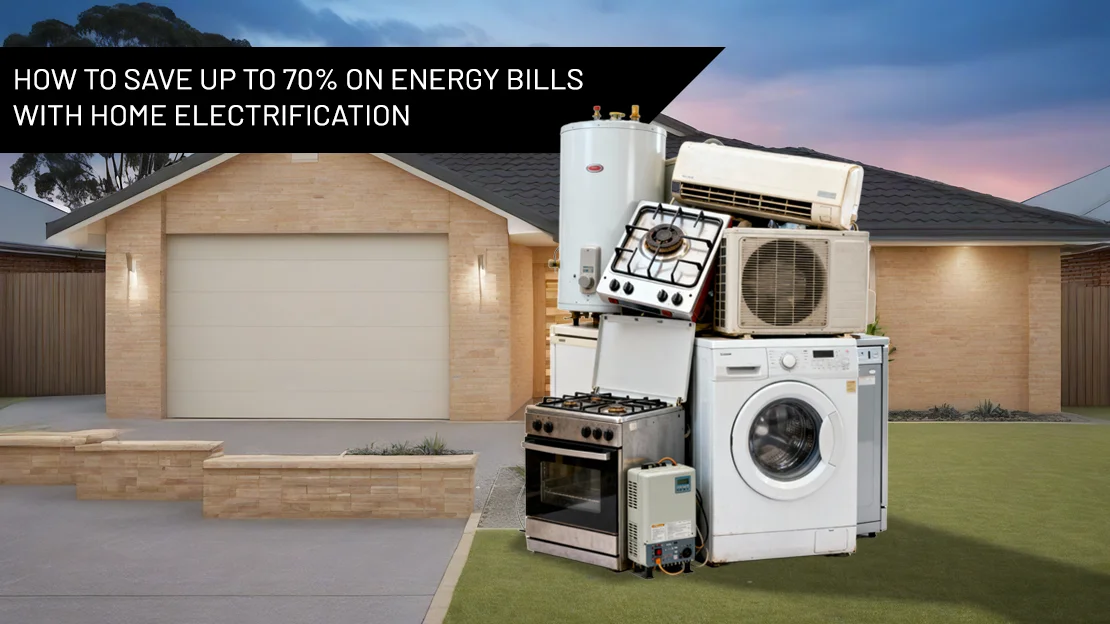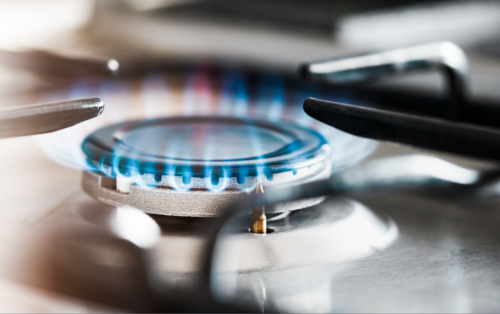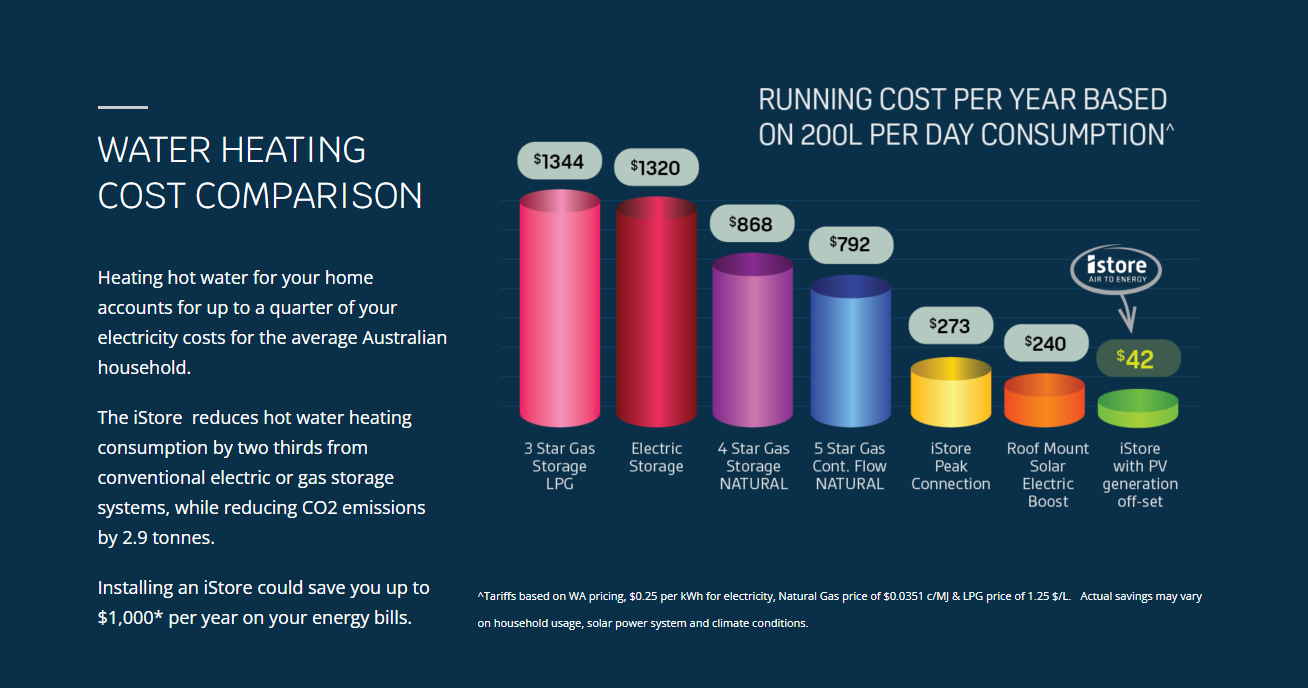
The Financial, Health and Environmental Benefits of Switching to Electric Appliances
Did you know that moving from gas to electric appliances could reduce household energy bills by as much as 70%? It’s a choice more and more Australian families are considering as they weigh the health, financial and environmental impacts of their cooking and water heating systems
In this blog, we’ll compare gas versus electric - unpacking hidden health risks, exploring current trends across Australian households and looking into the costs of making the switch alongside the broader benefits of embracing home electrification.
Gas vs Electric Cooktops
Health Implications

Can gas be harmful to human health? Yes - research has shown that gas stoves release pollutants such as nitrogen dioxide, carbon monoxide, and formaldehyde, which can exacerbate respiratory conditions like asthma. Similarly, gas water heaters emit harmful pollutants that can negatively impact indoor air quality and pose health risks, particularly for individuals with respiratory conditions. National Asthma Australia highlights a study that linked gas stoves to 12% of childhood asthma cases in Australia.
Cost considerations
Is gas really cheaper? In the long run, the answer is often no. Energy‑efficient electric cooktops, especially induction models, generally cost less to operate than gas because they use energy more effectively. Switching to electric appliances may raise your electricity bill slightly but, "the overall cost will be offset by improved efficiency — and your gas bills will decline or you may be able to disconnect your gas entirely,” notes Market Realist.
Electricity rates do vary depending on your local retailer, which can make natural gas appear cheaper at first glance. However, the improved efficiency of modern electric appliances offsets these costs over time. Although the upfront investment in an induction cooktop may be higher, many users find their energy bills decrease thanks to faster heating and minimal wasted energy.
| FACTOR | ELECTRIC COOKTOP | GAS COOKTOP |
| Energy efficiency | More energy-efficient, especially induction models | Less energy-efficient on average. |
| Operational costs | Typically lower, given energy-efficient options. | Varies by gas prices; can fluctuate. |
| Initial Costs | Higher upfront costs for electric models. | Generally lower initial set up costs. |
| Maintenance Costs | May have higher costs if repairs are needed. | Typically lower, but gas lines need maintenance. |
| Health Impact | Clean energy, doesn't product harmful gases | Produces indoor air pollutants (NO2, CO) known to trigger asthma and other adverse health events |
| Cooking/ heating speed | Faster heating, precise temperature control | Slower, less precise |
| Environmental Impact | Cleaner, especially if powered by renewables. | Higher carbon footprint than electric. |
Gas vs Electric Water Heating
What part will Switching to Hot Water Heat Pumps Play in my Home Electrification Journey? Did you know an electric hot water heat pump will save you 70% of your water heating costs compared to gas? Making the switch is a crucial step in your broader home electrification journey. You can even heat your water for free if you program your hot water heat pump to heat during daytime hours so that you can use your solar energy at no cost. Environmentally friendly, using electricity over gas improves your indoor air quality, reduces your reliance on fossil fuels and lowers greenhouse gas emissions. Electrification of homes is a key component in achieving our sustainability goals and reducing carbon footprints.
Cost considerations
The chart below shows how much money you can save on heating hot water with iStore's hot water heat pumps compared to gas or electric storage water heating systems. And as mentioned above, if you have solar panels, the cost can be further reduced by setting the timer on your heatpump to operate during the day.

But it's not all about the money, it turns out there are many other good reasons to ditch gas and make the switch to electric hot water heat pumps, as seen in the table below.
Comparison table shows how hot water heat pumps stack up against gas water heating.
| FACTOR | HOT WATER HEAT PUMP | GAS WATER HEATING |
| Energy efficiency | Higher initial investment | Usually lower purchase price |
| Running Costs | Lower bills over time due to improved efficiency | Rising gas prices; less efficient |
| Efficiency | Transfers energy directly | Energy losses |
| Health Impact | No combustion gases, cleaner air | Combustion gases contain nitrogen dioxide and Carbon monoxide |
| Safety | Cool to touch surfaces, automatic shut off | Open flame, risk of burns or leaks |
| Environmental Impact | Lower emissions, especially with solar power | Fossil fuel reliance, higher emissions |
| Future proofing | Aligns with electrification and renewable energy |
Can STC Rebates help offset the initial cost of buying a hot water heat pump?
Federal rebates are available via Small-scale Technology Certificates (STCs) and are usually offered as a discount on the upfront cost via your supplier at the time of installation. These heat pump rebates are already available for heat pumps and solar panels and from 1 July 2025, they will also apply to solar battery purchases. Interest-free loans are also available for the purchase of solar batteries from the federal government subject to eligibility requirements.
Additionally, some states have rebates available to assist with upfront costs like Victoria's "Gas to Electric Hot Water" rebate and cover an array of appliances. Interest free loans may also be available and are usually available in additional to federal rebates. It's best to check with your state government or your supplier for current information.
What are the best hot water heat pumps in Australia?

The most energy efficient hot water heaters are heat pumps which are extremely energy efficient. They convert thermal energy from the surrounding air into heat for water earning the name 'air to energy'. Solargain recommends iStore heat pumps that have recently won "Best Heat Pump" in the Solar Quotes 2025 Award and are also Product Review Award Winners 5 years in a row.
What Percentage of Australians have Switched to Electric in the Last Year?
According to the Australian Bureau of Statistics, approximately 38% of Australian households use mains gas for their hot water systems - highlighting the significant reliance on gas for water heating in many homes across Australia. The percentage of Australians using gas cooktops is higher at 48% gas of the time of writing. This significant portion highlights the widespread reliance on gas for cooking in Australia. However both Energy Consumers Australia and The Australian Institute describe a growing trend towards electrification as more people become aware of the health and environmental benefits. By joining the club, you will be preparing your home for future advancements in renewable energy.
What Products Can I Install to Help Me Switch to Electric?
To fully embrace electrification, consider installing:
- Electric Hot Water Heat Pumps: Electric hot water heat pumps are energy-efficient and safer than gas water heaters but not as efficient as heat pumps - choosing a hot water heat pump will save you more money.
- Induction Cooktops: For efficient and safe cooking choose an induction cooktop over a regular electric cooktop. While an electric cooktop is still a healthier option than gas, an induction cooktop utilises more energy efficient technology, provides more precise temperature control, is easier to clean and supports a modern kitchen aesthetic according to Choice Magazine.
- Heat Pump air conditioners can also be installed to heat your home and are safer, healthier and more cost effective than gas heating for your family.
Will a Battery-Ready Solar System Help Me Switch to Electric?
Yes, battery-ready solar can significantly aid in the transition to electric appliances. It allows you to generate solar during the day to power your home appliances including your heat pump, reducing your electricity costs. You can set the timer on an iStore heat pump to heat during the day when you are generating solar power and induction cooktops and heat pumps are highly energy-efficient.
- If you choose a battery-ready solar system with a hybrid inverter, you can add a solar battery to store excess solar energy generated in the day to use at night.
- The Australian Federal Government is offering battery rebates for solar batteries to households in Australia alongside state battery rebates.
- Making the leap to electric cars will help you lower your household electricity bills even further by factoring in the extra power you will need to cover your transportation needs.
Yes, I'm in! How can I make the switch?
Switching from gas to electric appliances is easy! Here's how;
To purchase an electric cooktop
- Assess Electrical Capacity: Ensure your home’s electrical system can handle the additional load. You may need to upgrade your electrical panel.
- Choose the Right Cooktop: An induction cooktop, is more energy-efficient and safer.
- Hire a Professional: It’s advisable to hire a licensed electrician to install the new cooktop and ensure all connections are safe and compliant with local regulations.
To purchase an hot water heat pump
- Evaluate Your Current System: Determine the capacity and efficiency of your existing gas water heater.
- Choose the Right Electric Water Heater: A heat pump is the most likely to meet your household’s hot water needs and energy efficiency goals.
- Professional Installation: Contact Solargain or another reputable supplier for a competitive quote to supply and install an iStore hot water heat pump. iStore's heat pumps are available in 2 sizes (180L and 270L) and have won awards from Product Review 2021-5 and Solar Quotes "Best Heat Pump 2025". iStore also manufacture pool heat pumps so that you can keep your pool warm all year round!
Conclusion
Switching from gas water heaters and cooktops to electric heat pumps and induction cooktops is a beneficial move for both health and environmental reasons. While there may be some initial costs and adjustments, the long-term benefits of improved air quality, reduced health risks, and contribution to a sustainable future make it a worthwhile investment. Benefits of home electrification include;
- Energy Efficiency: Electric systems, including heat pumps, are generally more efficient than their gas counterparts.
- Cost Savings: Reduced energy consumption leads to lower utility bills.
- Environmental Impact: Lower carbon footprint compared to gas heating.
- Safety: Eliminates the health and safety risks associated with gas leaks and combustion.
- Future-Proofing: Prepares your home for future advancements in renewable energy.
Get a Free Quote today!
References
- Australian Bureau of Statistics - Provides data on energy use in Australian households, including the use of gas and electric water heating systems.
- The Australia Institute - Highlights the positive sentiment towards household electrification in Australia.
- Energy Consumers Australia - Discusses the growing trend towards electrification and consumer attitudes towards gas and electric appliances
- The West Australian - This article discusses the health risks associated with gas cooktops and the author's personal experience of switching to an electric cooktop.
- iStore - Award-winning hot water heat pumps visual showing how much $$ you can save by switching from gas
- University Hospitals - Provides insights into the health impacts of gas stoves and the benefits of switching to electric alternatives.
- Asthma Australia - Highlights the prevalence of gas cooktops in Australian households and their link to asthma cases.
- Market Realist - Discusses the costs associated with converting from gas to electric stoves and potential savings.
- Choice Magazine - Provides a practical guide for planning home electrification, including the benefits and steps involved.
- Renew Magazine - Provides a "Getting Off Gas" Toolkit



